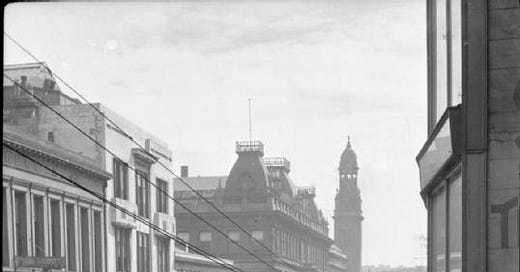Mr Hardie, who didn't want to pay for advice
One Scotsman in the 1880s was in need of a private detective - but he didn't want to pay...
Glasgow - home of detective John Fairweather - pictured some half a century after this case
In 1889, Glasgow-based private detective John Fairweather - a former insurance agent - travelled to the Dumbarton Small-Debt Court to sue Gordon Hardie for £1 1s.
This sum was what Fairweather charged for a two hour consultation (and for time lost) with Hardie. Hardie had called on Fairweather on 5 June, stating that he was owed money by a man in Newcastle, and wanted this man to be tracked down. Hardie asked what the detective's fees would be, and Fairweather calculated that the job would cost him £5. Hardie engaged him, and the next day, Fairweather waited several hours for further instructions from his client. Nothing happened.
The next afternoon, Fairweather received a letter, in which Hardie told him he was no longer engaged. The detective duly took him to court, and both parties appeared there about a fortnight later. Hardie insisted that he had no formal engagement with Fairweather, but had simply called on him to make enquiries. He also argued that "no one had a right to charge for a consultation except lawyers". Although several private detectives did offer free consultations, it would have been common knowledge that detectives could and did charge for their time and advice. The Sheriff of the court was one person who certainly knew this, and he found against Hardie, ordering him to pay - but not the £1 1s being asked for, but just for 10 shillings, with an additional 4s 4d of expenses.




